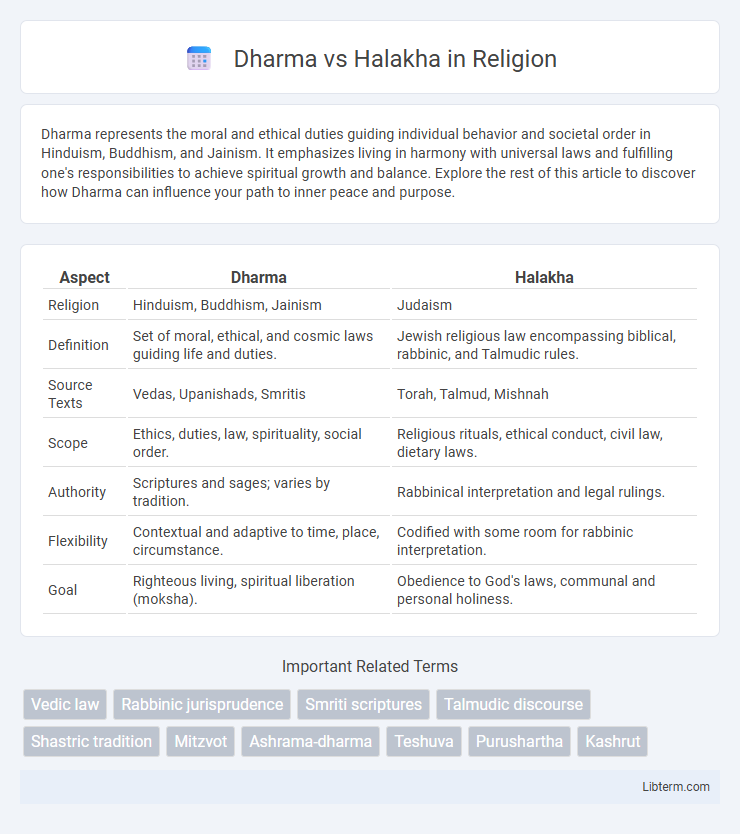Dharma represents the moral and ethical duties guiding individual behavior and societal order in Hinduism, Buddhism, and Jainism. It emphasizes living in harmony with universal laws and fulfilling one's responsibilities to achieve spiritual growth and balance. Explore the rest of this article to discover how Dharma can influence your path to inner peace and purpose.
Table of Comparison
| Aspect | Dharma | Halakha |
|---|---|---|
| Religion | Hinduism, Buddhism, Jainism | Judaism |
| Definition | Set of moral, ethical, and cosmic laws guiding life and duties. | Jewish religious law encompassing biblical, rabbinic, and Talmudic rules. |
| Source Texts | Vedas, Upanishads, Smritis | Torah, Talmud, Mishnah |
| Scope | Ethics, duties, law, spirituality, social order. | Religious rituals, ethical conduct, civil law, dietary laws. |
| Authority | Scriptures and sages; varies by tradition. | Rabbinical interpretation and legal rulings. |
| Flexibility | Contextual and adaptive to time, place, circumstance. | Codified with some room for rabbinic interpretation. |
| Goal | Righteous living, spiritual liberation (moksha). | Obedience to God's laws, communal and personal holiness. |
Introduction to Dharma and Halakha
Dharma and Halakha represent foundational ethical and legal systems in Hinduism and Judaism, respectively, guiding moral conduct and religious duties. Dharma encompasses diverse principles from ancient texts such as the Vedas and Upanishads, addressing cosmic law and individual responsibilities. Halakha is derived from the Torah, Talmud, and rabbinic literature, codifying Jewish law and everyday practices for community and spiritual life.
Origins and Historical Development
Dharma originates from ancient Indian Vedic traditions, evolving through Hindu, Buddhist, and Jain philosophies as a complex system of cosmic law and moral duty documented in texts like the Vedas and Upanishads. Halakha, rooted in the Torah and Talmudic teachings, developed through rabbinic interpretations and legal discussions that shaped Jewish religious law and ethical conduct over centuries. Both systems reflect the historical contexts of their respective cultures, with Dharma emphasizing universal principles and Halakha focusing on covenantal obligations within the Jewish community.
Core Philosophical Foundations
Dharma, rooted in Hindu, Buddhist, and Jain traditions, emphasizes cosmic order, duty, and righteous living as essential for spiritual harmony and societal balance. Halakha, central to Jewish law, derives from the Torah and Talmud, focusing on divine commandments and ethical conduct to guide everyday life and community cohesion. Both frameworks provide structured moral codes but differ in theological origins and interpretive methodologies shaping their legal and ethical principles.
Sacred Texts and Scriptures
Dharma is grounded in a vast array of sacred Hindu texts, including the Vedas, Upanishads, and the epics Mahabharata and Ramayana, which collectively outline moral duties, ethical conduct, and cosmic order. Halakha derives its principles primarily from the Torah, Talmud, Mishnah, and later rabbinic writings, serving as a comprehensive legal framework that governs Jewish religious and daily life. Both systems use their scriptures not only as spiritual guides but also as authoritative sources for legal and ethical behavior within their respective cultures.
Role in Daily Life and Practice
Dharma prescribes a broad ethical framework guiding individual duties, social responsibilities, and spiritual practices tailored to one's caste, age, and stage of life, deeply influencing daily rituals, dietary habits, and moral decisions. Halakha serves as a comprehensive legal system governing all aspects of Jewish daily life, including prayer, dietary laws (Kashrut), Sabbath observance, and civil matters, ensuring strict adherence to commandments passed down through Torah and Rabbinic interpretation. Both systems function as living traditions that shape community identity and personal conduct, structuring everyday behaviors through religiously mandated laws and customs.
Moral and Ethical Guidance
Dharma and Halakha both provide comprehensive moral and ethical guidance rooted in religious tradition, with Dharma emphasizing duties, righteousness, and the harmonious order of life in Hinduism. Halakha governs Jewish life through detailed laws and ethical principles derived from the Torah and Talmud, shaping behavior in daily activities and spiritual obligations. Both systems prioritize community welfare, individual responsibility, and justice, reinforcing ethical conduct as essential to spiritual fulfillment.
Authority and Interpretation
Dharma, rooted in ancient Indian scriptures like the Vedas and Upanishads, derives its authority from divine revelation and tradition, with interpretation often guided by learned sages and spiritual leaders who adapt its principles to varied contexts. Halakha, the collective body of Jewish religious laws, bases its authority on the Torah and Talmud, with rabbinic authorities and courts playing a central role in interpreting and applying the law to everyday life. Both systems emphasize the dynamic nature of interpretation, balancing scriptural mandates with contemporary needs through established scholarly frameworks.
Adaptation and Evolution Over Time
Dharma and Halakha have both demonstrated significant adaptation and evolution over centuries, reflecting changing social, cultural, and historical contexts. Dharma, rooted in ancient Indian scriptures, has evolved through interpretations by sages, accommodating diverse philosophical schools and practices across Hinduism, Buddhism, and Jainism. Halakha, the collective body of Jewish religious laws, has continuously adapted through rabbinic debates, responsa literature, and modern legal rulings to address contemporary ethical, social, and technological issues within Jewish communities worldwide.
Similarities and Differences
Dharma and Halakha both serve as ethical and legal frameworks guiding the behavior of their respective communities, with Dharma rooted in Hindu philosophy and Halakha in Jewish law. While Dharma encompasses a broad range of duties and moral principles varying by class, stage of life, and context, Halakha offers a codified set of commandments derived from the Torah and Talmud, emphasizing religious observance and daily conduct. Both systems integrate spiritual beliefs with practical governance, yet Dharma presents a more flexible, interpretative approach compared to the structured jurisprudence characteristic of Halakha.
Contemporary Relevance and Challenges
Dharma and Halakha continue to shape ethical frameworks and legal practices within Hindu and Jewish communities around the world, reflecting diverse cultural values and religious traditions. Contemporary challenges include adapting ancient laws to modern issues such as technology ethics, gender equality, and civil rights while maintaining religious integrity. Both systems face the task of balancing preservation of tradition with the demands of pluralistic, secular societies.
Dharma Infographic

 libterm.com
libterm.com